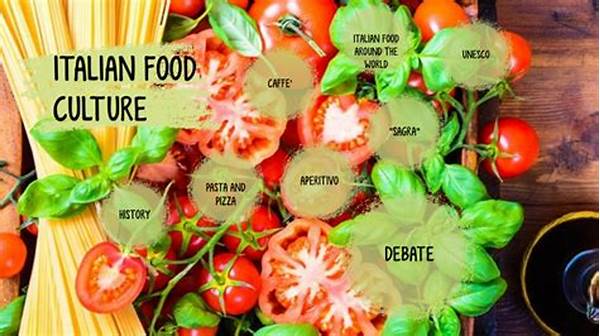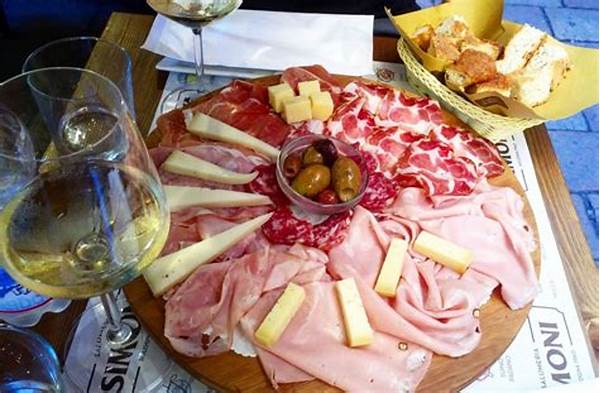Italy is celebrated not only for its sun-kissed landscapes and historical landmarks but also for its rich culinary traditions. The cultural significance of Italian meals goes beyond mere sustenance. It’s about connecting family, preserving age-old recipes, and laying down memories with every bite. Imagine savoring a plate of pasta, which is a history lesson on Italian culture, served with a hearty side of love and legacy. Let’s dig deeper into this flavorful journey through Italy.
Read Now : Exquisite Brunch Cuisine Offerings
Italian Meals as Cultural Beacons
Italian meals are like time capsules that hold the essence of Italy’s diverse regions, family traditions, and historical narratives. Whether it’s sharing a Sunday lunch with la famiglia or sipping espresso at a local café, the cultural significance of Italian meals lies in their ability to bring people together. It’s not just about food; it’s about a way of life. Meals are a showcase of regional pride, from the creamy risottos of Milan to the limoncello-tinted desserts of the Amalfi Coast. Heck, a family gathering in Italy isn’t just a meal, it’s an event. Each dish tells a story, passed down longer than a game of telephone. In Italian culture, food is love, journaled with sauces and spices, a shared symphony where everyone gets a solo.
Universality Yet Uniqueness in Italian Dining
1. Family First: Every Italian meal is an ode to family. It’s like a family reunion, only with fewer awkward questions. Celebratory and routine meals alike underscore this cultural significance, stitching ties tighter than a Nonna’s hug.
2. Regional Pride: Italians take serious pride in regional cuisines. From up north’s buttery risottos to the south’s tomato-kissed dishes, the cultural significance of Italian meals is deeply embedded in geographical origins.
3. Simplicity: Knock out meals with pomp and grandeur? Nah. Italian food celebrates simplicity. A few quality ingredients thrown together in a way that’s like a culinary high-five.
4. Tradition Keeps It Real: The cultural significance of Italian meals is fiercely protected through tradition. Recipes are passed down generations, honored more religiously than nonna’s Sunday mass.
5. Unspoken Rules: Unearthly combos like seafood and cheese are frowned upon. There’s an unwritten Italian food code that’s gospel, underscoring the cultural significance of Italian meals.
Food as a Social Glue
When Italians gather around the table, it’s for more than just appeasing hunger pangs. It’s a social ritual, a speaking tradition—in dialects if you’re lucky—that celebrates life itself. The cultural significance of Italian meals is rooted as much in conviviality as it is in flavors. Each meal is a chapter in the book of relationships. Like, sharing laughs over a plate of gnocchi is pure connective tissue. Italian meals also offer a slice of education. It’s where nonna schools you on family lore as you polish off her famous tiramisu. The table becomes a stage for discussions, debates, and the occasional argument about whether or not pineapple should ever touch a pizza. Spoiler: it shouldn’t.
Conversations at the Italian Table
1. Food for the Soul: Italian meals are soul food, but not just in the Southern style. They’re stress remedies and love letters on a plate.
2. Mama’s Courtroom: Dish debates. Ever seen a group of Italians seek truth? Put a pasta with cream in front of them. Cue passionate discourse.
3. The Family Crowns: Guests treated like royalty. Nonna’s gunning to serve; she won’t take no for an answer, ever.
4. Time Stands Still: Dinner for an hour? Ha! Budget three. Meals are marathons, not sprints, emphasizing the cultural significance of Italian meals as not bound by time.
5. Espresso Solves All: World problems get tackled over rib-breaking laughter, soulful sips of coffee.
Read Now : Creative Family Meal Night Ideas
6. Foodie Gossip: Every meal’s a chance to dish out the latest village tea while tasting new olive oil batches.
7. Market Magic: Sharing tales from market escapades—every tomato a character crackling with personality.
8. Season’s Best: Rave about seasonal produce. Winter lemoncello dreams and summer basil feasts.
9. Respect the Elders: The youth learn it’s a wise move to listen when the family’s gathered, gleaning all remnants of wisdom tossed into every meal.
10. Toasts & Cheers: Lifting glasses isn’t just a movement, it’s a declaration of unity and a salute to life’s quirky ride.
Breakfast: The Underrated Gem
When considering the cultural significance of Italian meals, many focus on the grandiosity of lunch and dinner. However, the humble Italian breakfast, or colazione, deserves its own applause. It’s a quaint affair usually starring cappuccino and a cornetto, Italy’s response to a croissant but flaunting a style of its own. Yes, breakfast often gets over in a flash but contains that same ethos of culture imbibed in slower meals. Imagine the morning sun spilling into a quaint café as Italians coast through their daily rituals of coffee and perhaps a dollop of gossip.
Culinary Customs Passed Through Generations
Families pass down not just their eye color but an encyclopedia of recipes. Italian kitchens could tell you more tales than your high school history books. Cooking becomes a rite of passage, where one graduates from stirring sauces to mastering ravioli folds. The cultural significance of Italian meals reaches far beyond satisfying hunger; it seals unforgettable bonds. Cooking secrets are family treasures, closely guarded and warmly shared with generations to come. Meals teach patience, love, and sometimes chaos—all delivered in servings as hearty as your Nonna.
The Symbolism of Every Bite
The moment you enter an Italian household, you’re greeted with aromas that are as comforting as an old blanket. Smells travel quicker than words here. Meals are served with side dishes of laughter and sometimes sides of spirited debates. Every bite you take is not just a bite; it’s a testament to the cultural significance of Italian meals. Each bite binds the eater to something much larger—a history, a family, a community. They say you are what you eat, but in this cuisine, perhaps it’s more apt to say you are where you eat. Food isn’t stuff to be gobbled down; it’s cherished and knew like an old friend.
By vividly understanding the cultural significance of Italian meals, we are blessed with more appreciation for the traditions and history infused into those beloved dishes. Meals become much more than just the course; they transform into culinary masterpieces that celebrate Italian culture in the most delicious of ways.



